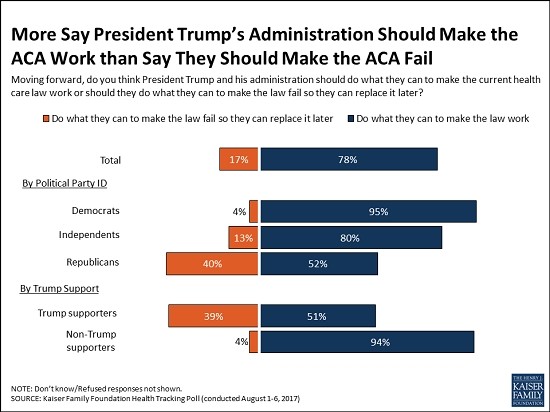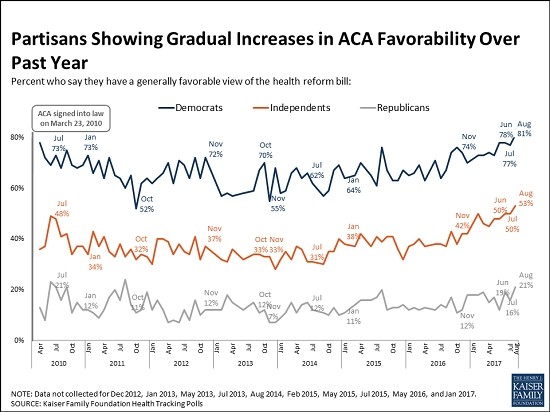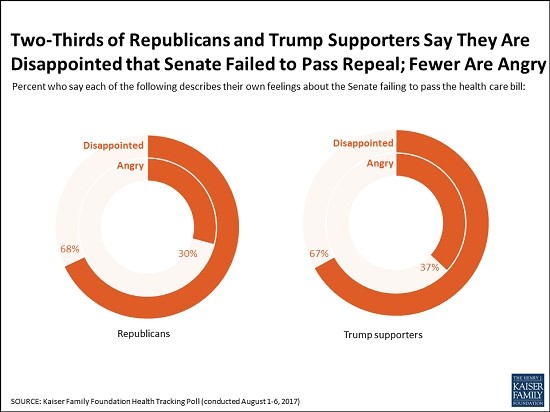
Most Americans Oppose Tough Negotiating Tactics Such As Ending Cost-Sharing Reduction Payments, but Most Republicans and Trump Supporters Favor Such Strategies; Most Republicans Are “Disappointed” But Not “Angry” That Repeal-and-Replace Legislation Did Not Pass Senate
CALIFORNIA—(ENEWSPF)–August 11, 2017. After the Senate’s failure to pass legislation to repeal and replace the Affordable Care Act, the latest Kaiser Health Tracking Poll finds that eight in 10 Americans (78%) say President Trump and his administration should do what they can to make the current health care law work.
This includes large majorities of Democrats (95%) and independents (80%), as well as about half of Republicans (52%) and President Trump’s supporters (51%). A much smaller share of the public (17%), including four in 10 Republicans (40%) and Trump supporters (39%), say the President and his Administration should do what they can to make the law fail so they can replace it later.

This finding and others from the poll suggest that most of the public is ready for Washington to move beyond the repeal-and-replace debate and instead focus on fixing shortcomings in the Affordable Care Act. For example:
- Most (57%) say Republicans in Congress should work with Democrats to make improvements to the 2010 health law. Far fewer want Republicans to continue working on their own plan to repeal and replace the law (21%) or move on to other priorities (21%). Most Democrats (70%) and independents (59%) favor the bi-partisan approach, though nearly half of Republicans (49%) and Trump supporters (46%) want Republicans to continue pursuing their own plan to repeal and replace the law.
- To push Democrats to work with Republicans on repeal and replace, President Trump has threatened to stop payments that compensate insurers for the Affordable Care Act’s cost-sharing reductions, which reduce out-of-pocket costs for lower-income Americans buying insurance through ACA marketplaces. Most (63%) of the public oppose such negotiating tactics that could disrupt insurance markets and cause people to lose health coverage. Three in 10 (31%) support President Trump using whatever tactics are necessary to encourage Democrats to start negotiating. Most Republicans (58%) and Trump supporters (59%) support these hardball negotiating tactics.
- Most (60%) of the public say that President Trump and Republicans in Congress control the government and are responsible for any problems with the ACA going forward, twice the share (28%) who say President Obama and Democrats in Congress are responsible for such problems.
- More Americans say it is more important for President Trump and Republicans to now make the Affordable Care Act’s insurance marketplaces work better (69%) than to continue plans to repeal and replace the law (29%). However, most Republicans (61%) and Trump supporters (63%) see continuing plans to repeal and replace the ACA as more important than helping the marketplaces work better (38% and 33%, respectively).
This month’s survey again finds more of the public holding a favorable view of the Affordable Care Act than an unfavorable one (52% vs. 39%). Favorable views have increased 9 percentage points since the 2016 presidential election, with the trend occurring among Democrats, independents, and Republicans.

When asked about the Senate’s failure to pass a repeal-and-replace bill, most Americans (60%) say it is a “good thing”, while about a third (35%) say it is a “bad thing.” Most of those who say it is a good thing say they do not want the law repealed at all (34% of the public overall), while fewer (23% of the public overall) say it is because they had concerns with the specific bill being debated.
More people say they are “relieved” (51%) or “happy” (47%) that the Senate did not pass a bill than say they are “disappointed” (38%) or “angry” (19%). While two-thirds of Republicans and Trump supporters report feeling “disappointed,” smaller shares (30% and 37%, respectively) report feeling “angry”.

This month’s survey also probes the public’s views about the Affordable Care Act’s insurance marketplaces, which allow Americans who don’t get insurance through their employer to shop for and purchase insurance, with tax credits available to low- and moderate-income customers.
Even though only about 10 million people receive coverage through the marketplaces, most (60%) Americans believe that their family will be negatively affected by rising premiums in the marketplaces, twice the share (31%) who say it would have no impact.
Similarly, six in 10 (60%) say that insurers’ decisions not to sell insurance plans in certain marketplaces will affect everyone with insurance, and three-quarters (76%) say so about insurers charging higher premiums in certain marketplaces.
Designed and analyzed by public opinion researchers at the Kaiser Family Foundation, the poll was conducted from August 1 – 6 among a nationally representative random digit dial telephone sample of 1,211 adults. Interviews were conducted in English and Spanish by landline (428) and cell phone (783). The margin of sampling error is plus or minus 3 percentage points for the full sample. For results based on subgroups, the margin of sampling error may be higher.
Source: http://kff.org








